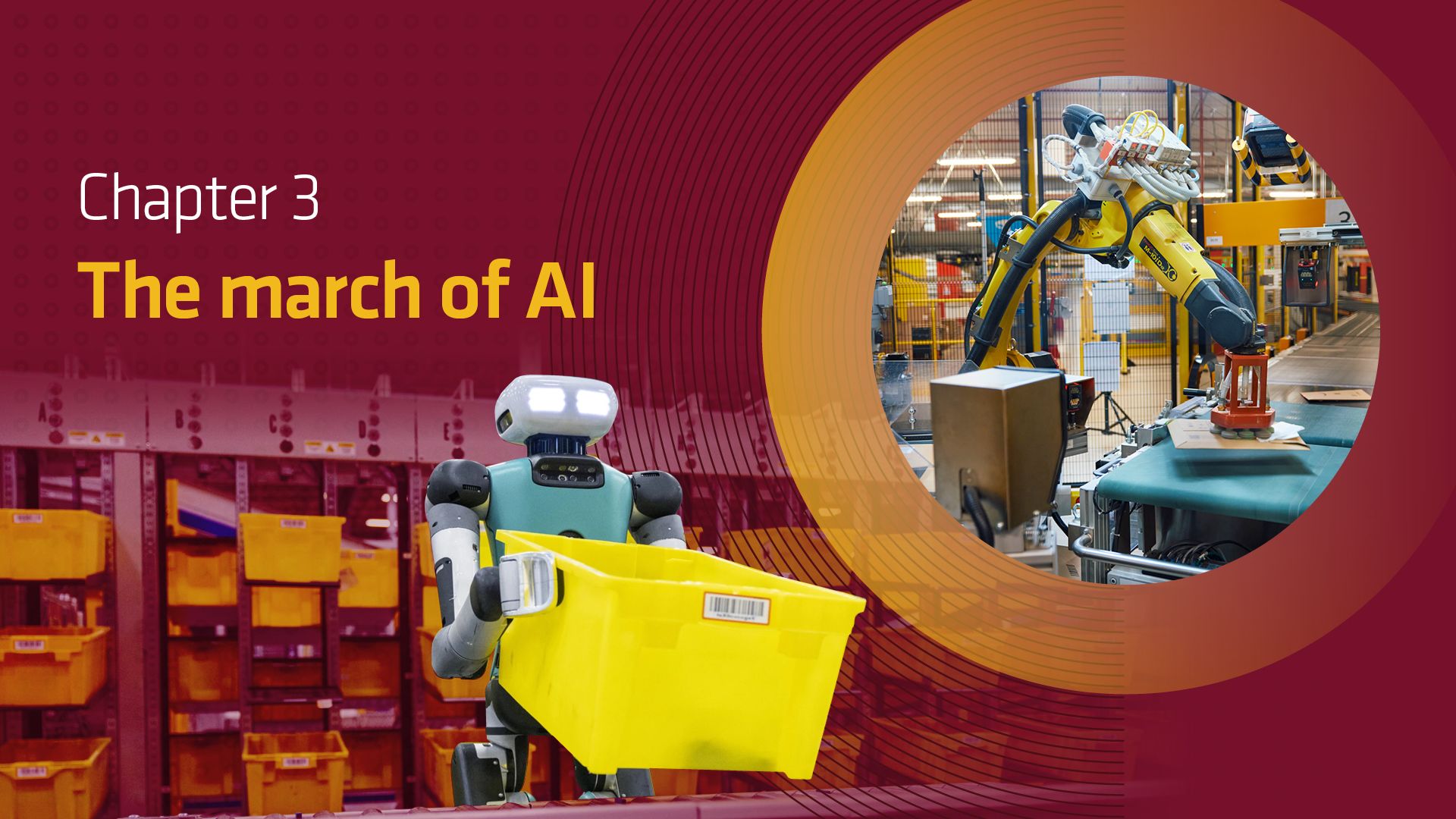
The UK retail industry is beginning to ramp up investment in the world of AI in order to unlock the potential it represents.
For some, it is being positioned as a central part of tech strategy, with Sainsbury’s saying in May that a new partnership with Microsoft was aiming to put “the power of AI” in the hands of staff and drive greater efficiency for employees and shoppers.
A statement from the grocer at the time suggested it was going to be using data to power a business built on “smart cloud foundations”, helping the company drive productivity and efficiency to achieve better outcomes for customers and shareholders.
Sainsbury’s staff are being enrolled on upskilling programmes to help them “learn and grow in the new AI-driven economy”, with the retailer’s chief retail and technology officer, Clodagh Moriarty, saying it aims to be “the UK’s leading AI-enabled grocer”.
On a global scale, Chinese fashion pureplay Shein and US grocer Walmart are highlighting the potential for AI-enabled operational transformation.
Walmart said in October 2023 that AI helps power it through the peak period. This is achieved by leveraging historical data and pairing it with predictive analytics to allow it to optimise inventory positioning for peak period.
The machine learning (ML) and AI system it has had in place since 2023 integrates insights from all Walmart sales channels, combining decades of customer service and peak period inventory management insights – and AI helps the retailer crunch the numbers quickly.
Parvez Musani, senior vice president for end-to-end fulfilment at the retailer, said in October 2023: “When building AI/machine learning frameworks for holidays, we start with a foundation of data and business constraints to create a possible universe of ML models.
“During model training, we fine-tune machine learning models using historical data like past sales, as well as online searches and page views.”
So-called future data is also considered – including macro-weather patterns, macroeconomic trends and local demographics – to help it understand demand and potential disruptions. Anomalies, such as heavy storms, are not carried over, though.
Shein, meanwhile, is using AI to analyse data, including web searches and social mentions, before using this information in product development. The social listening is used to gauge product demand fluctuations, and the insights feed into design and supply chain teams.
According to Shein, its unsold inventory level is now less than 10% compared with an industry average of between 25% and 40%, which it partly attributes to its use of AI.
And retailers’ interest in AI was only too clear to see in this year’s industry leader interviews. Of the 39 retailers we interviewed, just four are not using AI within their business.
We asked retailers to rate themselves from one (not using AI at all) to 10 (highly proficient and being used across multiple business areas), and found 75% rate themselves a five or below, with a bulk of 47% marking themselves between two and three. However, an encouraging 24% scored themselves between six and eight.
Below we have pulled out some of the different ways the retailer leaders we spoke to are tackling AI and its multiple use-cases in their respective businesses.
The Very Group
Robbie Feather, who was promoted to The Very Group chief executive role in April, says the Very.co.uk and Littlewoods owner is using AI for ecommerce customer experience, marketing, advertising, improving use of data, pricing, merchandising and credit controlling.
“We have been doing some work with Google, and they said our use of AI in some of our digital marketing is among the most advanced they‘ve seen in the UK,” he explains.
“We are very data-driven and we have the advantage that it‘s not just retail data but it‘s financial data on customers. So, we‘ve got an incredibly rich dataset.”
The Very Group reported a 92% drop in pre-tax profit over the year to July 1, 2023, dragged down by operating cost rises. The £4.6m profit came off the back of flat group sales of £2.15bn.
Robbie Feather: “We have been doing some work with Google, and they said our use of AI in some of our digital marketing is among the most advanced they've seen in the UK”
Robbie Feather: “We have been doing some work with Google, and they said our use of AI in some of our digital marketing is among the most advanced they've seen in the UK”
Matthew Moulding: “Probably the biggest benefits we've had so far are in the warehouse, in logistics, in automation, in robots, because they're doing an immense amount of work every day”
Matthew Moulding: “Probably the biggest benefits we've had so far are in the warehouse, in logistics, in automation, in robots, because they're doing an immense amount of work every day”
THG
Chief executive Moulding says AI is being used as “a problem solver” as well as driving greater efficiency on the company’s tech spend.
“There are cost savings you get through not needing people to do certain jobs because AI can pick that up – you‘re asking people to do a relatively manual task that you can now fully automate and learn from,” he explains.
The key to AI’s success, Moulding notes, is how it enables retailers to learn and continually iterate operations based on those insights. He argues that from a customer service point of view, there is only a finite number of questions a customer can ask – so once AI has been taught all of them it can find the solutions.
THG also uses AI in the warehouse, with robots continually learning more optimised ways of preparing and fulfilling goods, as well as in pricing – a key area for growing profit margin, Moulding says.
“Probably the biggest benefits we‘ve had so far, I would say, are in the warehouse, in logistics, in automation, in robots, because they‘re doing an immense amount of work every day,” says Moulding.
Notonthehighstreet
Describing her company’s relationship with AI, chief executive Rothwell probably speaks for an industry when she says “we're on the journey, but we‘re probably only just scratching the surface at the moment”.
Within Notonthehighstreet, she says “energy around it has been incredible” after initial hesitance, with multiple parts of the business embracing it and trying to understand what it can do for them.
From improving use of data and, in particular, personalisation and powering internal search to email marketing and paid media advertising, there are a whole host of areas in which AI is being used at the online retailer.
“We are starting to use generative AI in some of our creative practices, so really understanding how we scale those different types of content,” Rothwell adds.
“How can we use it in things like retouching and some of the more laborious manual tasks that would have been happening before? Our technology teams are also using it in their coding practices to help with quality assessment, helping to solve difficult problems.”
Website search functionality is where the biggest impact has been seen, according to the CEO.
“We‘ve seen a direct improvement in terms of click-through rate from search results to product details pages, and we saw this almost immediately from introducing the new improved search. We‘ve also seen a continuous conversion benefit from search so we are attributing this to the AI improvements that we‘ve made.”
Leanne Rothwell: “We've seen a direct improvement in terms of click-through rate from search results to product details pages, and we saw this almost immediately”
Leanne Rothwell: “We've seen a direct improvement in terms of click-through rate from search results to product details pages, and we saw this almost immediately”
“30% of all our customer contacts are now handled without any human intervention”
“30% of all our customer contacts are now handled without any human intervention”
Fashion retailer
The CEO of one fashion retailer says of AI: “We’re aware of it, excited by it, definitely doing some stuff with it, but nowhere near where I think we could potentially be with it.”
The company has invested in technology to digitise the online customer communication first, and has created its own AI council in-house to monitor usage and think in detail about governance as it explores the use of this new field of technology in more detail.
A key aspect of deploying AI in chatbot services, for example, is enabling a 24/7 customer support function that means the retailer can be always on for its customers.
And although the chief executive acknowledges it is difficult to put exact measurements against the success of AI deployment, he explains: “The customer experience is an easy one to measure.
“Something like 30% of all our customer contacts are now handled without any human intervention. And we‘ve got a really high NPS score of circa 72, so it‘s not like the customers are feeling as if they‘re being fobbed off. They‘re happy with the experience.”
N Brown
N Brown is using an AI-powered chat solution online, as well as embracing AI for social-proofing, user-generated content and personalisation in onsite search. In terms of pricing, AI helps N Brown maximise margin revenue and the sell-through of products.
Chief executive Steve Johnson says: “All of our products get set through a pricing tool, which is unique to N Brown – we built it ourselves; it’s called PriceTagger.”
The JD Williams, Simply Be and Jacamo parent company – which posted adjusted profit before tax of £13.3m for the 52 weeks to March 2, 2024, an £8.4m improvement on the previous year despite group revenue falling by 9.8% to £600.9m – has also deployed AI in product development and design, with customer brand avatars created using the tech, as well as in merchandising and advertising.
“From a Gen-AI perspective, we are using it to create product descriptions via our product information management technology – so we‘re quite into it,” Johnson says.
Much of that adoption has come in the last 12 months, so it’s fairly nascent stages and “very exploratory”, in Johnson’s words.
“We‘ve not had any challenges in the deployment of it, but colleague adoption – like anything when something new comes along – some people are early adopters, some people need a bit of help to work in different ways,” he adds.
“It’s not been a major issue; it‘s just the more you introduce these new ways of working, the more you need to support colleagues with it.”
Steve Johnson: “The more you introduce these new ways of working, the more you need to support colleagues with it”
Steve Johnson: “The more you introduce these new ways of working, the more you need to support colleagues with it”
Craig Ash: “While AI has a part to play in the retail journey, it‘s important that it doesn‘t overwhelm customers. It‘s ultimately the human that has the final word”
Craig Ash: “While AI has a part to play in the retail journey, it‘s important that it doesn‘t overwhelm customers. It‘s ultimately the human that has the final word”
Swarovski
Swarovski UK managing director Craig Ash says the jewellery retailer is using AI for ecommerce customer experience, improving use of data and personalisation, and product development and design. It has also been deployed in merchandising and demand forecasting, inventory management and supply chain.
“We‘re using obviously sophisticated algorithms to allow Swarovski to understand our customers better than before in anticipating their needs and being able to provide more personalised experiences,” he remarks.
A key focus for Swarovski, which posted sales growth of 4% to €1.8bn in 2023, is promoting clientelling in-store – where tech is used by staff to guide customers, upsell and give colleagues access to historic transactions and interactions with shoppers. AI is playing a role in this core part of Swarovski’s current strategy.
“Certainly in customer-facing areas, such as clientelling, we see a higher value per transaction where we‘ve used AI to enable our teams to make more informed recommendations and product choices,” Ash reports.
“While AI has a part to play in the retail journey, it‘s important that it doesn‘t overwhelm customers. You know, it can obviously generate insights to support decision-making, but it‘s ultimately the human that has the final word.”
Lounge
CEO Marsden says AI has been “a big focus” for the underwear retailer in the last 12 months, particularly around customer experience.
For example, AI is used to understand customer intent and for sentiment analysis in each consumer query “to help identify importance and priority of tickets to be answered by the team”. Marsden says this summary of conversations provided by the AI deployment ensures a “quicker resolution”, while the AI-powered chatbot for query resolution has led to 60% ticket deflection.
“Ultimately, AI supports us with streamlining functions, increasing conversion rates and creating tailored experiences for each of our customers,” notes Marsden, who adds that AI also plays a considerable role in marketing campaigns on Meta and in the form of automated PPC bids “to allow us to be reactive when it comes to bidding against our competitors”.
Daniel Marsden: “AI supports us with streamlining functions, increasing conversion rates and creating tailored experiences for each of our customers”
Daniel Marsden: “AI supports us with streamlining functions, increasing conversion rates and creating tailored experiences for each of our customers”
There is a general feeling among the retailers we spoke to that AI can speed up the way they work and bring cost savings. Even those that haven’t announced huge AI partnerships with big tech are reporting gains.
Wickes chief executive David Wood says the home improvement chain is building a new chatbot that will draw more on AI and “provide a much better service to the customers when they engage with that”.
“These things have good economic payback models at the moment,” he adds.
Wickes’ adjusted profit before tax for 2023 was £52m, which was down 31% year on year, attributed to a software-as-a-service investment, while revenue was relatively flat at £1.55bn.
Cotton Traders has adopted Photoshop AI, which has “improved the speed and efficiency of retouching images, enabling our team to work smarter”, according to CEO Hamblin.
“We have been able to bring 90% of the reprographics work in-house as a direct result of the improved work efficiency,” he continues.
Gift Universe’s Bennett says the business is using Gen-AI to create content for the website: “As a small business with a small team, it has enabled us to increase our productivity.”
Topps Tiles chief executive Rob Parker suggests the retailer is “using AI to write some marketing-type copy and experimenting with it” alongside its internal AI working committee, which is a form of in-house governance when considering where to use it more widely.
Topps Tiles reported a profit before tax of £6.8m for the year ending September 30, 2023, a 37.6% decrease year on year, despite a 6.3% increase in revenue to £262.7m.
U.S. Polo Assn.’s Prince says AI is coming into use around marketing, social media and product descriptions online, but the company is adopting a “test and learn” approach and pacing itself with using the tech. He also urges caution and fact-checking when deploying it.
“We created a new fashion magazine [Field x Fashion] and AI helped us pick the name of the magazine,” he adds.
“That was distributed to millions of consumers around the world and the feedback was tremendous. We actually already won an award around the magazine, and so we’re seeing the benefits.”
Similarly, Schuh’s Temple says “we are using it where we can get our hands on it” and the retailer is thinking about AI pragmatically, rather than as a catch-all, solve-all technology investment per se.
From customer experience such as chatbot tech and data personalisation to merchandising, demand forecasting and in the wider supply chain, there are several areas where AI is being utilised at Schuh.
But in a warning to retailers looking to introduce AI, Temple adds: “There are always challenges in rolling technology out because the technology has got to shake hands with your incumbent systems.
“I think that’s where the problems come – it’s great if you’ve got a greenfield site and you can build everything brand-new. If you have legacy systems, things are going to be more difficult.”
Indeed, the full benefits of AI, and in particular Gen-AI, come with sophisticated data orchestration. And the research shows only 62% of retailers have a single view of stock in real time and just one-third have a single view of their customers in real time.
The true power of AI only comes for retailers if they are confident in their data accuracy because they can deploy it with intent and be confident that the output is based on solid truth.
It is one of the reasons organisations – including technology retailer Currys – have spent a lot of time managing and migrating data to the cloud in recent years. They know they will get the best results from AI if they are confident in the data they put into these modelling systems at the outset.
Wider data work is needed if retailers are to get the most from emerging strands of AI.







